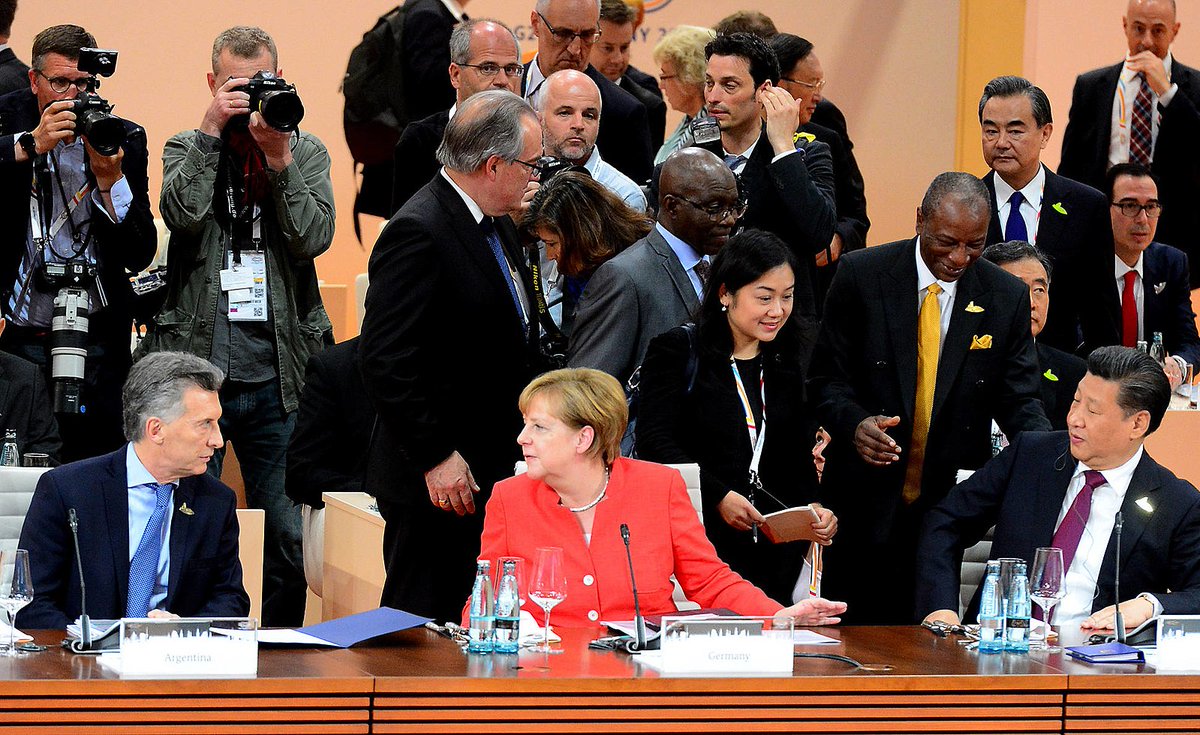
I just re-read Professor Auer's @stefanauer_hku fascinating research article "Merkel’s Germany and the European Union: Between Emergency and the Rule of Rules".
His article can help us understand Merkel's advocacy of the highly controversial #CAI /1
cambridge.org/core/journals/…
His article can help us understand Merkel's advocacy of the highly controversial #CAI /1
cambridge.org/core/journals/…
Auer writes that "Europe’s many problems are centred around Germany, the reluctant hegemon (Paterson 2011) whose leadership oscillates between acting in the name of the exception and insisting on an apolitical adherence to the rule of law" /2
While he insists that this article is "not just about one particular political leader" he makes clear that "Angela Merkel and her governing style – ‘avoiding politics whenever possible’ (...) – serve as a synecdoche that captures problems inherent in the European project" /3
Auer highlights reluctance of German political elites to think of their nation’s interests as separate from those of Europe at large". This is a very important insight, as we will soon find out /4
Auer points out that "technocratic rule is no less a danger to democracy than the rise of populism". He refers to "the Maastricht Treaty: the creeping empowerment of non-majoritarian regulatory bodies, and the concomitant hollowing-out of democracy in Europe" to make his point /5
His overall argument is that "the European project must be more political and less technocratic". This is an excellent point, which can not be emphasised enough. The EU has too long been an elite-driven economic project, not a political project /6
Auer argues that "Merkel’s governing style provides a lens through which the EU’s deep-seated structural flaws can be better understood and addressed". In the following I will highlight parts of his essay which I consider relevant for our understanding of Merkel's role re #CAI /7
Auer first reflects on German political culture. He highlights that for historical reasons "Germans are understandably wary of conflictual politics as such". In light of Germany's troubled history, this should come to no surprise /8
Reflecting on the rise of successive grand coalition governments Auer highlights that "Germany’s preference for anti-conflictual politics extends to an uneasiness about the very notion of power and its traditional vehicle, national sovereignty" /9
He highlights that German governments have tried to achieve their objectives through the European project. This is a very important insight, as we will see /10
Auer then goes on to argue that "the apparent symbiosis between German and European ways of doing politics is not without its incongruities. Denial of power does not equal its absence." His following point is particularly interesting from the perspective of the #CAI debate /11
Auer writes: "The tendency to equate German with European interests is deeply problematic. It paradoxically reduces German political elites’ awareness of their responsibility towards the outside world" /12
In the following I am briefly summarising Auer's argument. Since German interests have to be camouflaged as European interests, senior German politicians tend not to pay sufficient attention to the needs and interests of its other European partners /13
This is exactly what we are seeing right now, with a Politico report suggesting that "Italy, Poland, Belgium and Spain don’t like the way the investment agreement was pushed through in the last days of the German presidency of the EU" /14
politico.eu/article/german…
politico.eu/article/german…
Auer makes a case to overcome the deficiencies of German political culture by "conceptualiz[ing] political challenges in an open-ended way, escaping the clutches of ideology". He is right of course, but easier said than done, as this requires a high degree of reflexivity /15
I am curious how Professor Auer @stefanauer_hku would interpret Merkel's role in the #CAI saga. Will she get away with her attempt to depoliticise EU-China relations so she can pursue narrow German corporate interests through Brussels? Won't other EU member states object? /16
And doesn't the heavy criticism of the #CAI on social media suggest that Merkel may meet considerable societal resistance to her pet project before stepping down in Autumn 2021? /17
I guess in the end it all depends on how much resistance European civil societies can muster. TTIP was rejected on principled grounds. In my view the #CAI needs to be defeated as well /18
#StopCAI #NotInMyName
theguardian.com/commentisfree/…
#StopCAI #NotInMyName
theguardian.com/commentisfree/…
• • •
Missing some Tweet in this thread? You can try to
force a refresh




